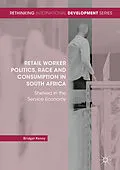This book argues that we need to focus attention on the ways that workers themselves have invested subjectively in what it means to be a worker. By doing so, we gain an explanation that moves us beyond the economic decisions made by actors, the institutional constraints faced by trade unions, or the power of the state to interpellate subjects. These more common explanations make workers and their politics visible only as a symptom of external conditions, a response to deregulated markets or a product of state recognition. Instead - through a history of retailing as a site of nation and belonging, changing legal regimes, and articulations of race, class and gender in the constitution of political subjects from the 1930s to present-day Wal-Mart - this book presents the experiences and subjectivities of workers themselves to show that the collective political subject 'workers' (abasebenzi) is both a durable and malleable political category. From white to black women's labour, the forms of precariousness have changed within retailing in South Africa. Workers' struggles in different times have in turn resolved some dilemmas and by other turn generated new categories and conditions of precariousness, all the while explaining enduring attachments to labour politics.
Autorentext
Bridget Kenny is Associate Professor of Sociology at the University of the Witwatersrand, South Africa. She works on labour, gender and consumption with a specific focus on service work, precarious employment, and political subjectivity.
Inhalt
Chapter 1. Introduction: Precarity in Store
Two for the Price of One: The Inadequacies of Instrumentalism
Servicing South Africa: Retail Spaces as Nation
Law and the Category of Employee
Subjects-in-Struggle: The Political Subjectivity of Retail Workers
Chapter 2. Servicing a Nation: White Women Shop Assistants and the Fantasy of Belonging
Retail Capital, the City and White Belonging
White Women's Service Labour
Skill and Status
Rules and Respectability
Retail Expansion, Deskilling and Racial Reorganization
The Necessary Familiarity of White Women's Labour
Chapter 3. Rupturing Relations: Abasebenzi as Collective Political Subject
Black Women's Service Work: Discriminatory Conditions and Racist Relations
Refusing Erasure, Rupturing the Logic of Relations: Abasebenzi Emerge
CCAWUSA and Collective Labour Politics
Chapter 4. Regulating Retail: The Category Employee and its Divisions
Subjects of Employment Law: Employee and Labourer
Part-time Employment: From Responsible Motherhood to Monstrous Deprivation
Casual Employment: Student Labour, Extra Help and Scabs
Chapter 5. Signifying Belonging: Restructuring and Workplace Relations
The Hypers: Revolutionizing Modern Retailing, 1975 to the 1990s
A Culture of Threat: Changing Workplace Relations from the late 1990s
A Disordered Present: The Past Moral Economy of the WorkplaceSubjectification of Workers: Outsider, Criminal, Labourer
Chapter 6. Tools Down, Everybody out to the Canteen!: Wildcats and Go-slows, Political Subjects Reconfigured
We are Grown-Ups: Permanent Workers as Adult Decision-makers
I must Make a Sale: Contract Workers as Skilled Men
[We] Bring more Money: Casual Workers as Exploited Labour
Joint Actions: Race and Rights
Chapter 7. To Sit at Home and Do Nothing: Gender and the Constitutive Meaning of Work
Sitting: Statis as Social Death
The Praxis of Providing
Gendered Anxieties: Working for Children, Working for the Future
Chapter 8. Consuming Politics: Wal-Mart, the New Terrain of Belonging and the Endurance of Abasebenzi
The Market as Nation
Labour Broking and Bulk Labour Supply
The Law and Political Subject Abasebenzi
Conclusion: Enduring Retail Worker Politics
